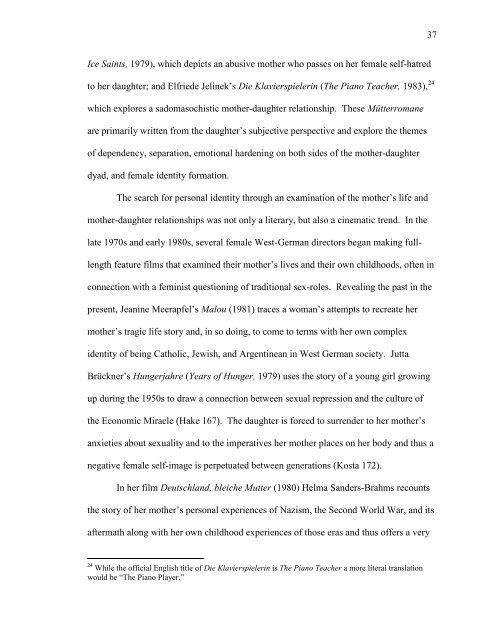'Murderer's House' - University of Victoria
'Murderer's House' - University of Victoria
'Murderer's House' - University of Victoria
You also want an ePaper? Increase the reach of your titles
YUMPU automatically turns print PDFs into web optimized ePapers that Google loves.
Ice Saints, 1979), which depicts an abusive mother who passes on her female self-hatred<br />
to her daughter; and Elfriede Jelinek‟s Die Klavierspielerin (The Piano Teacher, 1983), 24<br />
which explores a sadomasochistic mother-daughter relationship. These Mütterromane<br />
are primarily written from the daughter‟s subjective perspective and explore the themes<br />
<strong>of</strong> dependency, separation, emotional hardening on both sides <strong>of</strong> the mother-daughter<br />
dyad, and female identity formation.<br />
The search for personal identity through an examination <strong>of</strong> the mother‟s life and<br />
mother-daughter relationships was not only a literary, but also a cinematic trend. In the<br />
late 1970s and early 1980s, several female West-German directors began making full-<br />
length feature films that examined their mother‟s lives and their own childhoods, <strong>of</strong>ten in<br />
connection with a feminist questioning <strong>of</strong> traditional sex-roles. Revealing the past in the<br />
present, Jeanine Meerapfel‟s Malou (1981) traces a woman‟s attempts to recreate her<br />
mother‟s tragic life story and, in so doing, to come to terms with her own complex<br />
identity <strong>of</strong> being Catholic, Jewish, and Argentinean in West German society. Jutta<br />
Brückner‟s Hungerjahre (Years <strong>of</strong> Hunger, 1979) uses the story <strong>of</strong> a young girl growing<br />
up during the 1950s to draw a connection between sexual repression and the culture <strong>of</strong><br />
the Economic Miracle (Hake 167). The daughter is forced to surrender to her mother‟s<br />
anxieties about sexuality and to the imperatives her mother places on her body and thus a<br />
negative female self-image is perpetuated between generations (Kosta 172).<br />
In her film Deutschland, bleiche Mutter (1980) Helma Sanders-Brahms recounts<br />
the story <strong>of</strong> her mother‟s personal experiences <strong>of</strong> Nazism, the Second World War, and its<br />
aftermath along with her own childhood experiences <strong>of</strong> those eras and thus <strong>of</strong>fers a very<br />
24 While the <strong>of</strong>ficial English title <strong>of</strong> Die Klavierspielerin is The Piano Teacher a more literal translation<br />
would be “The Piano Player.”<br />
37

















